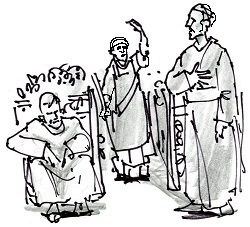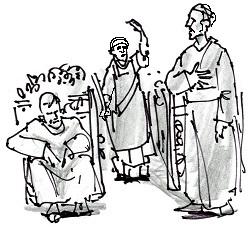

“A man had two sons” (Matt 21: 28).
Zep 3:1-2, 9-13; Matt 21:28-32
One help in listening to scripture is to ask, “What is the good news here?” Too often our minds anticipate “bad news” in the form of warnings or demands to do more to be sure we have God’s approval. During Advent, the scriptures can often seem to offer both good news and bad news. John the Baptist is all about judgment, while Jesus offers mercy. But if we listen deeply, every encounter with the living Word offers us good news.
Today’s Gospel parable contrasts the reactions of two sons when their father asks them to go and work in the vineyard. The first son says, “No, I will not,” but later reconsiders and goes to work in the vineyard. The second son says “Yes,” but does not go.
Jesus addresses this parable to the chief priests and elders of the people, then asks them, “Which son did his father’s will?” They correctly answer, “The first one.” Jesus then applies the lesson to the response of sinners to his invitation to enter the reign of God. They resisted or delayed, but then embraced Jesus’s message, while the righteous people gave empty approval and cautious affirmation because of the popularity of both John the Baptist and Jesus, but did nothing. The chief priests and elders are thus confronted with the fact of their resistance to God’s call to repentance and acceptance of mercy, while public sinners they despised, tax collectors and prostitutes, were took heaven by storm (Matt 11:12).
It would seem that this parable was bad news for this proud audience of religious leaders, but only if they failed to heed its lesson. God’s kingdom was open to them and awaiting their entry. These learned priests and scholars knew that the vineyard Jesus’ referring to was a symbol of Israel and the beloved community God had promised his people. This was the good news they were rejecting.
For sinners, despite their initial reluctance, the parable offered unconditional mercy. Whatever sins they may have committed or however late their conversions, they were welcome in God’s vineyard. What better news could there be? Jesus was eagerly gathering them and all the outcasts and despised into God’s beloved community.
As in all of Jesus’ parables of contrast, we, too, are invited to identify with the two sons. Which response and action best describes our own situation? How decisive have we been in our faith and especially in living it out? If we feel affirmed by our progress and efforts, this is good news. But if we feel a pang of regret for our procrastination and inaction, God is still calling us his children and urging us to share in the joy of the beloved community. It is never too late to seek mercy. Today is always the day of salvation, good news to anyone to who turns to God.
The Advent is the season of hope because a Savior is given to all people of good will. Now as it was then when Jesus was born into a sinful, violent world, God’s mercy is again proclaimed to people weary of hatred, division and despair. The birth of child, any child, is an affirmation that God is still confident that we can and will work together to heal our differences and create a world worthy of our children. To this good news let us say a resounding “Yes.”
Advertisement






